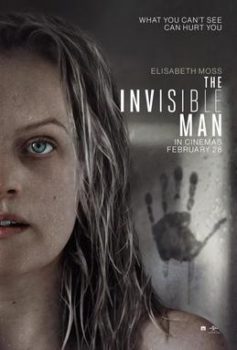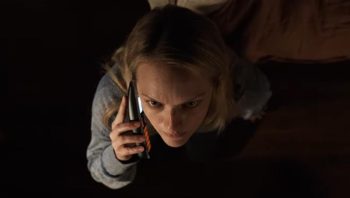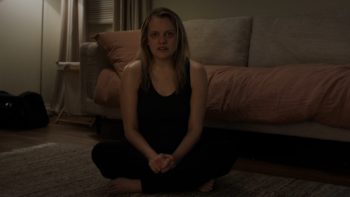The Invisible Man: Movie Review
The Invisible Man stars Elisabeth Moss in an adaptation of the classic H. G. Wells novel, presenting a fresh, technophobe horror story which examines obsession, control, and the unravelling of an individual’s sanity throughout its 124-minute runtime.
Dir: Leigh Whannell. Starring: Elisabeth Moss, Oliver Jackson-Cohen, Aldis Hodge, Storm Reid, Harriet Dyer, Michael Dorman
 Directed by Leigh Whannell, the writer responsible for the best of the Saw franchise and the director of the painfully underrated Upgrade, the film opens with Cecilia Kass (Elisabeth Moss) executing a lingeringly anxious and dread-filled escape from the isolated, labyrinthine home of genius optical scientist, Adrian Griffin (Oliver Jackson-Cohen). The entire scene – from Kass carefully peeling away Griffin’s hand from her waist to the final terrifying moments of her escape – is a brilliant way of indicating the film will centre entirely on Kass, while illustrating that Griffin is very much the terrifying, unseen presence even without the illusion of invisibility.
Directed by Leigh Whannell, the writer responsible for the best of the Saw franchise and the director of the painfully underrated Upgrade, the film opens with Cecilia Kass (Elisabeth Moss) executing a lingeringly anxious and dread-filled escape from the isolated, labyrinthine home of genius optical scientist, Adrian Griffin (Oliver Jackson-Cohen). The entire scene – from Kass carefully peeling away Griffin’s hand from her waist to the final terrifying moments of her escape – is a brilliant way of indicating the film will centre entirely on Kass, while illustrating that Griffin is very much the terrifying, unseen presence even without the illusion of invisibility.
This opening scene also introduces us to the double-edged sword of cinema scores; working brilliantly in the opening scene and in moments throughout the rest of the film, but veering off into a strange bio-mechanical screech when replacing an impending-doom sound sting. It might not be overly distracting for the majority of viewers, but it felt disorienting when compared with the slow, humming menace of those opening minutes, and never felt cohesive with the rest of the film’s tone.
 For the remainder of the film, we observe Kass as she initially attempts to heal herself and address the trauma controlling her life and thoughts, creates new connections with James Lanier (Aldis Hodge) and his daughter Sydney (Storm Reid), while rediscovering a sisterly bond with protective-sceptic, Alice (Harriet Dyer). Just as Kass is finding her feet in a safe, new world, she receives the suspiciously timely news that Griffin has ended his own life – gasp – and that he left Kass a sizeable fortune – double gasp – which requires her to remain in almost constant contact with Griffin’s deplorably slimy brother, Tom (Michael Dorman).
For the remainder of the film, we observe Kass as she initially attempts to heal herself and address the trauma controlling her life and thoughts, creates new connections with James Lanier (Aldis Hodge) and his daughter Sydney (Storm Reid), while rediscovering a sisterly bond with protective-sceptic, Alice (Harriet Dyer). Just as Kass is finding her feet in a safe, new world, she receives the suspiciously timely news that Griffin has ended his own life – gasp – and that he left Kass a sizeable fortune – double gasp – which requires her to remain in almost constant contact with Griffin’s deplorably slimy brother, Tom (Michael Dorman).
Despite these ill-fitting devices – how does Kass face Tom when she can barely check the mail? – Kass is then subject to increasingly perplexing gaslighting by an invisible force, gradually escalating from misplaced items and paranoia to public murder and forced admittance to an institution. Unfortunately, this is where the film falls apart. Perhaps it’s just my grim mentality toward horror, but the final act of The Invisible Man feels heavily edited, rewritten or adjusted to suit a different tone.
 Horror, for me at least, isn’t synonymous with Thriller. In the latter, the audience experience sustained terror with an obvious out, simply biding their time for a moment of victorious opportunity. In horror, you often find characters fighting a hopeless crusade, doomed from the opening moments of the film to fail and suffer in truly horrifying and tragic circumstances. Which is why ambiguous or hopeless endings – Drag Me To Hell, Don’t Look Now, Oculus, The Thing – leave such a lasting impression on an audience; that we’re humans fighting against terrible gods, and that the true horror is our misplaced hope in surviving it.
Horror, for me at least, isn’t synonymous with Thriller. In the latter, the audience experience sustained terror with an obvious out, simply biding their time for a moment of victorious opportunity. In horror, you often find characters fighting a hopeless crusade, doomed from the opening moments of the film to fail and suffer in truly horrifying and tragic circumstances. Which is why ambiguous or hopeless endings – Drag Me To Hell, Don’t Look Now, Oculus, The Thing – leave such a lasting impression on an audience; that we’re humans fighting against terrible gods, and that the true horror is our misplaced hope in surviving it.
With The Invisible Man, I felt cheated by the victories. They felt cheap, directed, and miscalculated, the kind that makes you question character motivation and authenticity instead of revelling in a well-earned moment of survival. Painfully, it unravels almost two hours of character development we’ve experienced through sharing Kass’ struggle, and the two hours of build-up we’ve had to potentially the most sinister and depraved horror villain in recent history.
 Instead, the film settles for a safe conclusion, complicating the narrative with personal victories and resolution when it’s unnecessary to do so, and raising questions about the authenticity of the characters. There’s a scene toward the middle of the film where Kass is sitting alone, surrounded by debris and speaking to someone she’s unsure is there, which is truly horrifying; Why me? Why am I subject of your unspeakable and relentless oppression and evil?
Instead, the film settles for a safe conclusion, complicating the narrative with personal victories and resolution when it’s unnecessary to do so, and raising questions about the authenticity of the characters. There’s a scene toward the middle of the film where Kass is sitting alone, surrounded by debris and speaking to someone she’s unsure is there, which is truly horrifying; Why me? Why am I subject of your unspeakable and relentless oppression and evil?
Horror isn’t required to provide answers, closure, or resolution to a narrative. When it does, the mystery and macabre atmosphere are prone to vanish. After all, what is more terrifying? That you are tormented and controlled because someone wants something from you? Or because you have no choice, and you are simply at the mercy of a god, regardless of what you can offer?
This is partly what I felt the novel addressed, and we’ve seen in multiple adaptations since; that the power of a god is not fit for the mind of a human, and that absolute power corrupts absolutely – that when we release ourselves from the constraints of humanity, we so often lose that humanity as well. The main issue with removing those elements from a narrative is that we’re left with little beyond good versus evil, right versus wrong, justice versus injustice – and when a film tries to sell the idea that the lesser evil is the righteous option, then the only horror remaining is our willingness to believe that is true.
~Oxford Lamoureaux